The RCPath Achievement Award winners exemplify excellence in pathology practice, education and training. We are delighted to showcase this year’s winning teams from across the UK and overseas. Covering a range of pathology specialties, they demonstrate teamwork at its best, ultimately improving the care and treatment of patients.
The RCPath Achievement Award winners

The College President presented members from the winning teams with their awards at the College’s Annual Dinner on 22 June.
Black Country Pathology Services IT Team
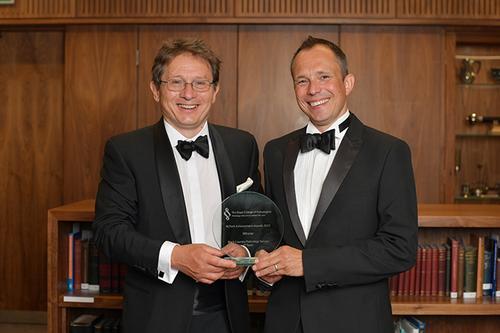
Black Country Pathology Service IT Team – Dr Branko Perunovic and Mr Nick Fudger
Modern IT infrastructure was vital to transforming the pathology services in the Black Country Integrated Care System. Since establishing the Black Country Pathology Service (BCPS) at the end of 2018, the Black Country Pathology Service IT team consolidated the cervical screening programme for West Midlands and regional cellular pathology and microbiology at the Hub. The team is finishing the consolidation of blood sciences in the Hub/ESL model, which is emerging as one of the most mature networks in England, with a projected saving of £60 million over the next 10 years.
The unsung heroes of this transformation is the BCPS team, now 24 members strong. It is fully embedded in the organisation and is essential for clinical service delivery. Despite the pandemic and recovery, they delivered successful large-scale IT implementation while effectively supporting the continuity of clinical services and regional COVID testing. The transformational portfolio includes procurement and implementation of a single LIMS for the region, its integration with the complex IT of 4 acute trusts and primary care, the first deployment of ICE8.3, integration of new technologies (microbiology automation, digital and computational pathology, automation and specialist equipment for all blood sciences), leveraging unified IT and clinical informatics, and designing and supporting value-added patient-centred developments.
Care Fertility
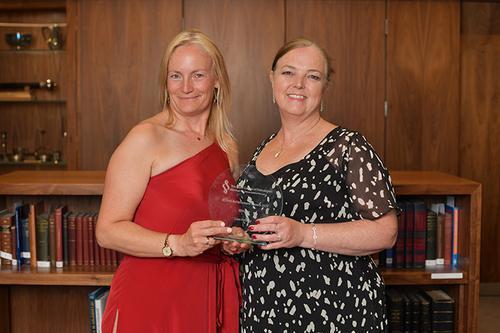
A team of IVF scientists (embryologists) at Care Fertility have undertaken extensive research for over a decade to improve the accuracy of embryo selection. Recent research from the team highlighted how they do not always agree on which IVF embryo to select for treatment.
Together they collated almost half a billion images from 63,000 human embryos in vitro. They used their time-lapse incubators to train and validate a machine learning model to assess embryos in near real-time from fertilisation to the point of embryo transfer, accurately and automatically.
Accuracy was assessed using previously unseen embryos by comparing the results of the machine-learning model with human assessments. This research was selected and presented at the European Society conference by a fellow of the Royal College of Pathologists.
The efficacy and comparability of the model to automate reliable, utilisable information was demonstrated by comparison with manual assessment data and the model’s ability to generate data to predict birth. Birth-predictive capability was measured and benchmarked against manual methods and known outcomes.
This technological innovation is accurate, reproducible, quick, safe and non-invasive. It is now being used clinically to improve embryo selection, predict IVF outcomes and improve efficiency across 14 UK IVF laboratories.
The Clinical Haematology Team at the Royal Oldham Hospital
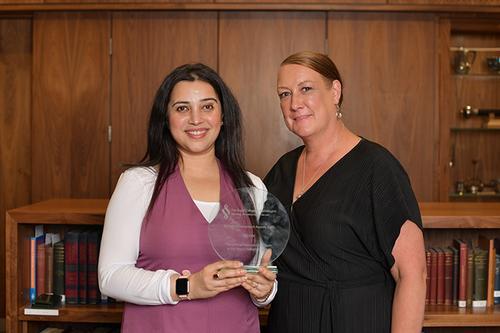
The haematology department at the Royal Oldham Hospital has pioneered an at-home chemotherapy treatment model under the leadership of Dr Satarupa Choudhuri, which has been recognised by the National Health Service Journal and the Macmillan excellence award. The team introduced a first of its kind quality marked service where the Macmillan nursing team, following a holistic needs assessment, administers the chemotherapeutic drug azacitidine (a subcutaneous injection for treating myeloid malignancies) in patients’ homes, enabling a safe and sustainable service.
Prior to this new treatment model, patients who were mostly elderly had to visit the extremely busy unit, making an average of 100 hospital visits depending on the duration of the disease response. Adding to the stress of an incurable malignancy with pre-existent comorbidities was the confusion associated with a complex treatment regimen resulting in several patients declining what is essentially their only option for life-prolonging treatment, with those continuing to experience a significant impairment to their quality of life.
Following its introduction, the service has reduced the number of hospital visits per month from about 10 to 2, saving approximately 540 minutes of chair time per treatment cycle, improving patients’ experience and keeping vulnerable patients safe in their own homes.
Department of Histopathology, Teaching Hospital, Anuradhapura, Sri Lanka
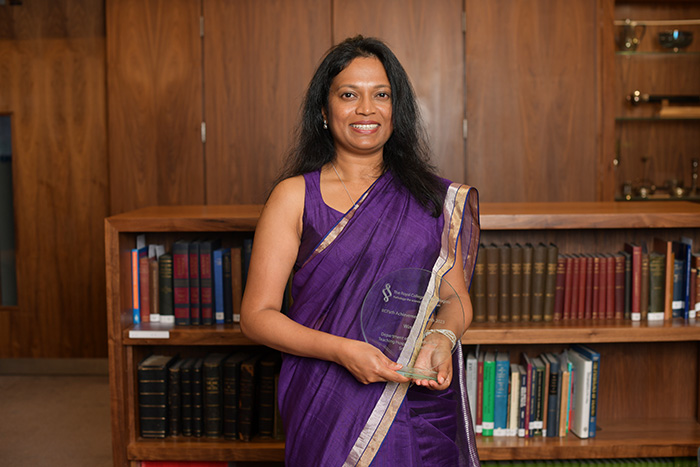
Department of Histopathology, Teaching Hospital, Anuradhapura, Sri Lanka – Dr Hiranya Tennekoon accepted the award on behalf of the team.
The Department of Histopathology, Teaching Hospital, Anuradhapura, started molecular testing of Her 2/Neu through the DISH method with the help of Mithuruwela Cancer Trust in late 2022 for the first time in Sri Lanka.
Prior to this, molecular testing was not available in the state sector in Sri Lanka and when it was necessary for equivocal cases on immunohistochemistry, patients had to get it done through the private sector, which was costly.
Therefore, at times, poorer patients did not receive standard treatments. Now people can receive this valuable test at no cost. The molecular testing facility has now been extended to the entire island and several patients have been referred from other provinces as well.
The Department of Histopathology, Teaching Hospital, Anuradhapura, is one of the busiest such units in Sri Lanka comprising 2 consultant histopathologists (a fellow and a diplomate of the College), 4 medical officers, 10 laboratory technicians and 5 laboratory assistants.
Starting a new service, especially molecular testing, in a time with many economic constraints is very challenging but due to the dedication of the team working together, it was successfully established to give a proper service to breast cancer patients.
NHS Lothian Medical Microbiology and Virology
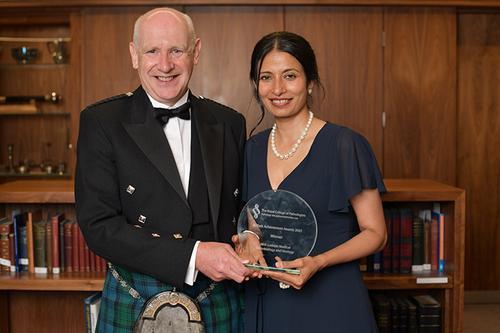
In 2019, the Medical Microbiology and Virology team in Edinburgh (NHS Lothian) identified an improvement opportunity with the launch of Combined Infection Training (CIT).
A focused boot camp approach was trialled to teach laboratory skills. Based on initial feedback, the course was developed further with input from biomedical and clinical scientists, simulation specialists, university researchers and medical staff. This Simulation Bootcamp was launched in 2021 and follows the patient’s pathway from clinical presentation to clinical decision-making via laboratory diagnostics. The training engages infection trainees in multiple simulation group teaching activities that develop competencies in practice in laboratory medicine and clinical infection service delivery.
Consistent 5-star reviews by trainees and trainers are a testament to the Bootcamp’s success. In 2022, the training was endorsed by the Scottish Infection Training Committee, which recommended it be rolled out to all Scottish CIT trainees to bring together a sense of community, share resources and increase sustainability. The Bootcamp continues to provide a novel cutting-edge platform for infection medicine training in Scotland, embodying the College’s strategic aim to develop and maintain high standards of training.
Highly commended
Buku Medicine
Buku Medicine is a free liaison app to help reduce the workload on haematologists and other medical specialists by providing a concise and clinically relevant resource for referrers. The app was created 5 years ago by Alex Langridge, consultant haematologist, and has been developed by a management team alongside a team of specialist contributors.
The British Association of Gynaecological Pathologists (BAGP)
In 2020, cognisant of the difficulties in providing training during the COVID pandemic, the BAGP began free live interactive webinars in gynaecological pathology aimed primarily at UK trainees. To date, over 5,500 pathologists comprising trainees and consultants from across the world have benefited from the webinars. The webinars have provided accessible high-quality learning for a global audience and a free interactive platform for pathologists from under-resourced countries, enabling best practice in gynaecological pathology.
Cellular Pathology Lab Team
The Derbyshire Pathology Cellular Pathology Service experienced a sudden increase in histology demand of approximately 35% and the gynaecology cytology service saw a huge surge in demand post-covid lockdown occurring at the same time as the implementation of an entirely new Lab IT System. The Cellular Pathology leadership team undertook an evaluation of workflow to systematically identify constraints and bottlenecks. In collaboration with the lab teams, they developed a multi-strategy intervention that employed a combination of organisational change, implementation of new IT hardware, improved configuration of existing software and assignment of dedicated resources to lab staff training.
CRY Cardiovascular Pathology Team
This unit was set up in 2013 and deals with hearts from sudden cardiac death cases referred by pathologists from throughout the UK. The team accept and report on 500 hearts per year and issue a report for the coroner, referring pathologist and family within 2 weeks of referral. They have also developed a unique database that provides valuable results for the families, many publications and which has yielded new insights into sudden cardiac death which leads to therapeutic intervention and prevention in families who suffer such a traumatic event.
National Minimum Retesting Intervals in Pathology Project Team
Inappropriate laboratory testing has the potential to waste potential resources and affect patient care and safety. Minimum retesting intervals (MRI) are an example of a successful and sustainable demand management tool. Prior to 2010, there was limited evidence of using MRIs. In 2011, the ACB prepared a set of consensus/evidence-based recommendations. In 2015, these were expanded to include all pathology areas supported by the College. The recommendations have been translated into Turkish and Spanish to allow its adoption in more countries.
The Pathology Portal Team
In August 2022, the Pathology Portal was launched. It now has over 3,160 live modules, 30,000 launches and 90% 5-star ratings.
It includes:
- ‘case’ formats with clinical data – plates, films, whole slide images, molecular data, etc
- SCORM e-learning packages
- guidelines, web links and videos as sole items or in cases
- books and atlases
- single best answer and multiple choice questions, ‘match game’ and image zone formats
- feedback with text, images and videos
- formative and summative quizzes
- ‘back end’ functionality redesign for simple module upload
- record of modules completed for portfolio.
Sheffield Staff COVID Drive Thru Team
Sheffield Virology Service was one of the first NHS Laboratories to develop an in-house dual target SARS-CoV-2 assay (5 March 2020) in response to the pandemic.
Within a short timeframe, the team adopted a staff and patient testing program. This expanded to provide a 24/7 regional service including the design and development of a staff drive-through service.
Transplant Immunology
The Transplant Approach and Relative Opportunity Tool (TAROT) is a dynamic, risk-adjusted model for the progression of patients to renal transplantation. The tool has been developed by Transplant Immunology working in collaboration with clinical colleagues as the Complex Immunology MDT. The approach is applicable to all patients, from the least to the most problematic in terms of their immunological obstacles to transplant, and delivers equity and equality into the system by defining a process and treating all patients in the same way.

